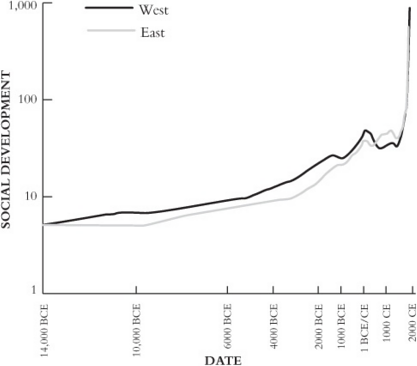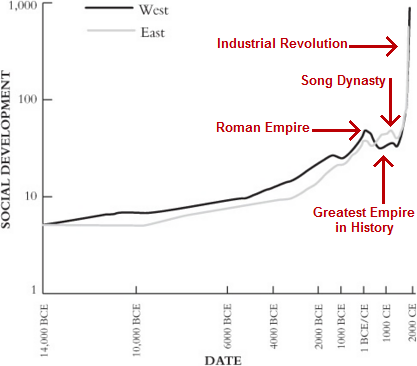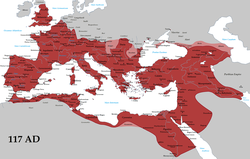Post by freediver on Jul 3rd, 2014 at 7:20am
In "Why the West Rules ~ For Now, The patterns of history and what they reveal about the future", Ian Morris weaves together the entire history of human civilisation into a coherent and interesting story. To do this, he creates his own social development index to allow comparison of societies separated by both space and time. This is similar in concept to the UN human development index, but simplified to account for the difficulties in obtaining historical information. The index is based on four separate measures (p 148)- total per capita energy use (including food, fossil fuels, etc), urbanism (maximum city population - a proxy measure for organisational capability), information processing and military capacity. These four measures tend to tell the same story.
Although a rough measure, the index highlights some interesting trends - see attached (figure 3.7, p 166). The east lead for a long period - between roughly 540 and 1770. For the entire history of human civilisation prior to 540 CE, the west lead, and has lead since 1770, although the east is now catching up again. In my opinion more interesting: a high level of development was reached in the Roman Empire during the first century CE. The same level was reached by Song dynasty China around 1100, followed by a similar lengthy decline. Both east and west broke through this level arounbd 1700. That is, European civilisation did not reach the same level as during the Roman Empire until 300 years ago.
Morris uses the index to introduce his thoery of a "hard ceiling" that limited development to the same level in the Roman Empire and Song Dynasty. The inability to break through this barrier lead to the eventual collapse of the civilisation and a long period of decline. He credits the recent breaching of this barrier to the heavy use of fossil fuels and industrialisation, which enabled the nomadic culture on the central asian steppes to finally be squeezed out. It was only around this time that a border was established between Russia and China. Prior to this, the nomadic peoples generally had the upper hand in conflict and they played a role in the collapse of just about every major empire. Genghis Khan was one of many.
Morris actually begins the story before 14000 BC, going through pre-modern human species and technology, with a focus on climate change as a key driver. He presents some interesting new evidence of interbreeding between modern humans and neanderthals, whose DNA can be found in Europeans and Asians (but not Africans).
http://www.ozpolitic.com/forum/YaBB.pl?num=1399971565
Morris presents the 7 key regions around the globe where agriculture developed independently, with the east and the west centred on two of these cores. Morris argues that settlement (permanent villages) came prior to agriculture, with the initiation and rate of development largely determined by the natural suitability of an area. His argument is a subtle form of geographic determinism, including some of the ideas presented by Jared Diamond in "Guns, Germs and Steel". He shows how the western core has gradually moved north and west, while the eastern core has moved east, and at a critical time, south. A key theme is the "changing meaning of geography", which caused the core of each civilisation to move as different geographies were favoured at different stages of social development. For example, the second key stage (cities) arose with agriculture in land that was less suited to the simpler style of agriculture that initially spawned each core. A very similar concept is the "advantage of backwardness", where challenges faced on the 'backward' periphery of civilisation caused new adaptations that improved civilisation and often moved the core, usually creating a massive upheaval in the process (the most direct form being a new empire over-running the old one). Yet another similar concept is that "you cannot cross the same river twice". Literally, this is a reference to the fact that the water you crossed over last time has moved on. This is used as an analogy for the changing meaning of geography, and that an idea or strategy that worked once is not going to work a second time. Civilisation itself canges the context that created civilisation in the first place.
Morris spends considerable time discussing the process by which the cores expanded and moved, settling on an obvious combination of the spread of ideeas and technology and the movement of people, particularly in the early agricultural phases.
Another common theme Morris uses is the five horsemen of the apocalypse - migration, state failure, famine, disease and climate change. The linking of the eastern and western cores by trade sparked a major round of disease that drove down development in both cores (the black plague). However it also eventually lead to the killing of the fifth horseman of the apocalypse (migration) when the two corse expanded to squeeze out the nomadic step
 why_the_west_rules_fig_3_7.png (39 KB | 303
)
why_the_west_rules_fig_3_7.png (39 KB | 303
)
Although a rough measure, the index highlights some interesting trends - see attached (figure 3.7, p 166). The east lead for a long period - between roughly 540 and 1770. For the entire history of human civilisation prior to 540 CE, the west lead, and has lead since 1770, although the east is now catching up again. In my opinion more interesting: a high level of development was reached in the Roman Empire during the first century CE. The same level was reached by Song dynasty China around 1100, followed by a similar lengthy decline. Both east and west broke through this level arounbd 1700. That is, European civilisation did not reach the same level as during the Roman Empire until 300 years ago.
Morris uses the index to introduce his thoery of a "hard ceiling" that limited development to the same level in the Roman Empire and Song Dynasty. The inability to break through this barrier lead to the eventual collapse of the civilisation and a long period of decline. He credits the recent breaching of this barrier to the heavy use of fossil fuels and industrialisation, which enabled the nomadic culture on the central asian steppes to finally be squeezed out. It was only around this time that a border was established between Russia and China. Prior to this, the nomadic peoples generally had the upper hand in conflict and they played a role in the collapse of just about every major empire. Genghis Khan was one of many.
Morris actually begins the story before 14000 BC, going through pre-modern human species and technology, with a focus on climate change as a key driver. He presents some interesting new evidence of interbreeding between modern humans and neanderthals, whose DNA can be found in Europeans and Asians (but not Africans).
http://www.ozpolitic.com/forum/YaBB.pl?num=1399971565
Morris presents the 7 key regions around the globe where agriculture developed independently, with the east and the west centred on two of these cores. Morris argues that settlement (permanent villages) came prior to agriculture, with the initiation and rate of development largely determined by the natural suitability of an area. His argument is a subtle form of geographic determinism, including some of the ideas presented by Jared Diamond in "Guns, Germs and Steel". He shows how the western core has gradually moved north and west, while the eastern core has moved east, and at a critical time, south. A key theme is the "changing meaning of geography", which caused the core of each civilisation to move as different geographies were favoured at different stages of social development. For example, the second key stage (cities) arose with agriculture in land that was less suited to the simpler style of agriculture that initially spawned each core. A very similar concept is the "advantage of backwardness", where challenges faced on the 'backward' periphery of civilisation caused new adaptations that improved civilisation and often moved the core, usually creating a massive upheaval in the process (the most direct form being a new empire over-running the old one). Yet another similar concept is that "you cannot cross the same river twice". Literally, this is a reference to the fact that the water you crossed over last time has moved on. This is used as an analogy for the changing meaning of geography, and that an idea or strategy that worked once is not going to work a second time. Civilisation itself canges the context that created civilisation in the first place.
Morris spends considerable time discussing the process by which the cores expanded and moved, settling on an obvious combination of the spread of ideeas and technology and the movement of people, particularly in the early agricultural phases.
Another common theme Morris uses is the five horsemen of the apocalypse - migration, state failure, famine, disease and climate change. The linking of the eastern and western cores by trade sparked a major round of disease that drove down development in both cores (the black plague). However it also eventually lead to the killing of the fifth horseman of the apocalypse (migration) when the two corse expanded to squeeze out the nomadic step
 why_the_west_rules_fig_3_7.png (39 KB | 303
)
why_the_west_rules_fig_3_7.png (39 KB | 303
)



